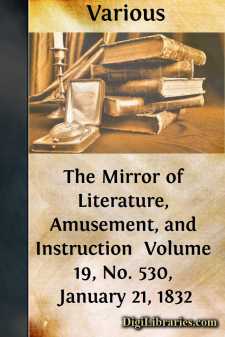Categories
- Antiques & Collectibles 13
- Architecture 36
- Art 48
- Bibles 22
- Biography & Autobiography 813
- Body, Mind & Spirit 142
- Business & Economics 28
- Children's Books 15
- Children's Fiction 12
- Computers 4
- Cooking 94
- Crafts & Hobbies 4
- Drama 346
- Education 46
- Family & Relationships 57
- Fiction 11828
- Games 19
- Gardening 17
- Health & Fitness 34
- History 1377
- House & Home 1
- Humor 147
- Juvenile Fiction 1873
- Juvenile Nonfiction 202
- Language Arts & Disciplines 88
- Law 16
- Literary Collections 686
- Literary Criticism 179
- Mathematics 13
- Medical 41
- Music 40
- Nature 179
- Non-Classifiable 1768
- Performing Arts 7
- Periodicals 1453
- Philosophy 64
- Photography 2
- Poetry 896
- Political Science 203
- Psychology 42
- Reference 154
- Religion 513
- Science 126
- Self-Help 84
- Social Science 81
- Sports & Recreation 34
- Study Aids 3
- Technology & Engineering 59
- Transportation 23
- Travel 463
- True Crime 29
The Mirror of Literature, Amusement, and Instruction Volume 19, No. 530, January 21, 1832
by: Various
Categories:
Description:
Excerpt
LAW INSTITUTION.
This handsome portico is situate on the west side of Chancery Lane. It represents, however, but a portion of the building, which extends thence into Bell Yard, where there is a similar entrance. The whole has been erected by Messrs. Lee and Sons, the builders of the new Post Office and the London University; whose contract for the present work is stated at 9,214l. The portion in our engraving is one of the finest structures of its kind in the metropolis. The bold yet chaste character of the Ionic columns, and the rich foliated moulding which decorates the pediment, as well as the soffit ceiling of the portico, must be greatly admired. We should regret this handsome structure being pent up in so narrow a street as Chancery Lane, did not the appropriateness of its situation promise advantages of greater importance than mere architectural display.
From the Fourth Annual Report, we learn that "the plan of the Law Institution originated with some individuals in the profession, who were desirous of increasing its respectability, and promoting the general convenience and advantage of its members." Rightly enough it appeared to them "singular, that whilst the various public bodies, companies, and commercial and trading classes in the metropolis, and indeed in many of the principal towns in the kingdom, have long possessed places of general resort, for the more convenient transaction of their business; and while numerous institutions for promoting literature and science amongst all ranks and conditions of society, have been long established, and others are daily springing up, the attorneys and solicitors of the superior courts of record at Westminster should still be without an establishment in London, calculated to afford them similar advantages; more particularly when the halls and libraries of the inns of court, the clubs of barristers, special pleaders, and conveyancers, the libraries of the advocates and writers to the signet at Edinburgh, and the association of attorneys in Dublin, furnish a strong presumption of the advantages which would probably result from an establishment of a similar description for attorneys in London.
"For effecting the purposes of the institution, it was considered necessary to raise a fund of 50,000l. in shares of 25l. each, payable by instalments, no one being permitted to take more than twenty shares. The plan having been generally announced to the profession, a large proportion of the shares were immediately subscribed for, so that no doubt remained of the success of the design, and the committee therefore directed inquiries to be made for a site for the intended building, and succeeded in obtaining an eligible one in Chancery Lane, nearly opposite to the Rolls Court, consisting of two houses, formerly occupied by Sir John Silvester (and lately by Messrs. Collins and Wells,) and Messrs. Clarke, Richards and Medcalf, and of the house behind, in Bell Yard, lately in the possession of Mr. Maxwell; thus having the advantage of two frontages, and, from its contiguity to the law offices and inns of court, being peculiarly adapted to the objects of the institution."
"It is the present intention of the committee to provide for the following objects:—viz—A Hall, to be open at all hours of the day; but some particular hour to be fixed as the general time for assembling: to be furnished with desks, or inclosed tables, affording similar accommodations to those in Lloyd's Coffee House; and to be provided with newspapers and other publications calculated for general reference."
"An Ante-room for clerks and others, in which will be kept an account of all public and private parliamentary business, in its various stages, appeals in the House of Lords, the general and daily cause papers, seal papers, &c."
"A Library to contain a complete collection of books in the law, and relating to those branches of literature which may be considered more particularly connected with the profession; votes, reports, acts, journals, and other proceedings of parliament; county and local histories; topographical, genealogical, and other matters of antiquarian research, &c....












